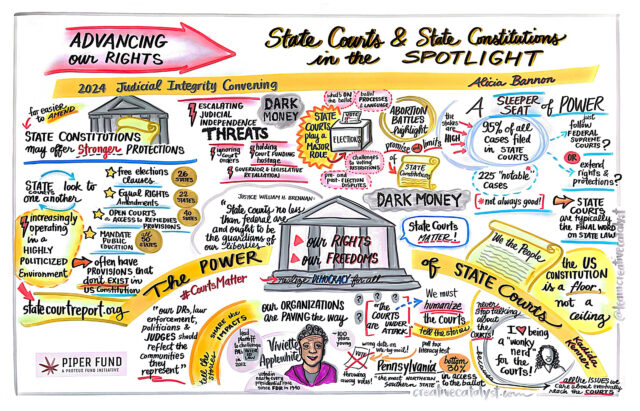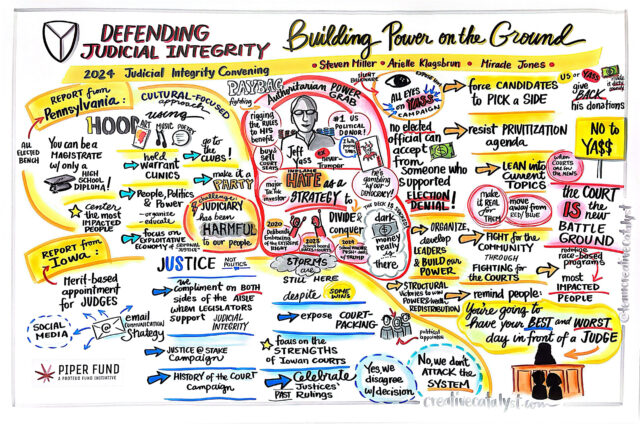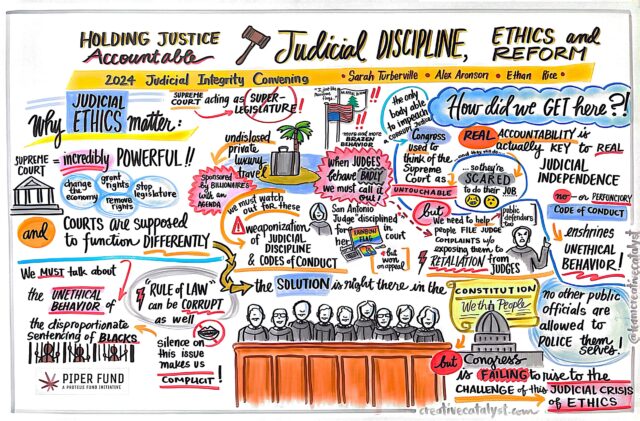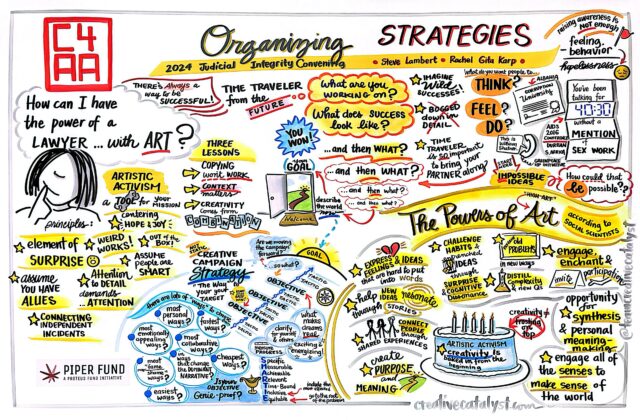Communicating the real-life impact of state courts. Seeking solutions to state courts’ wide-ranging inequities. Educating community members about what they can do to support greater state court integrity.
Those were among the goals of a realistic, productive, and, ultimately, hopeful three-day Piper Fund Judicial Integrity 2024 Convening in Minneapolis on June 3-5, 2024.
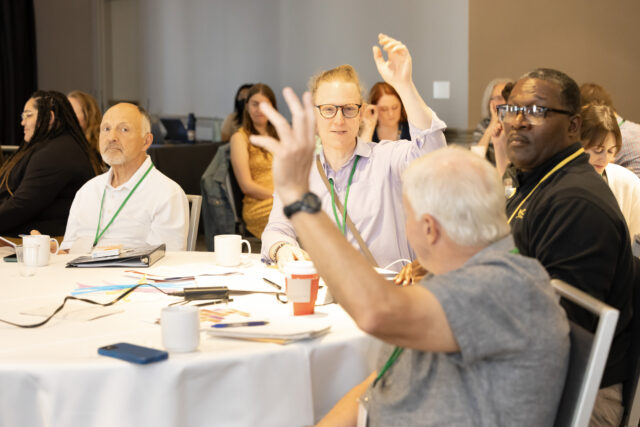 About 100 grassroots activists, scholars, and lawyers from 21 states gathered, all knowing what’s at stake: state courts’ impact on the everyday lives of average people. They weren’t in a hotel conference room for three days to unemotionally wade into the weeds of legal citations. No, they joined together to become better equipped with ideas, messages, and newly met collaborators to combat a well-funded right-wing movement seeking to install an authoritarian vision that threatens our democracy. They convened to be inspired and to go home with new-found energy.
About 100 grassroots activists, scholars, and lawyers from 21 states gathered, all knowing what’s at stake: state courts’ impact on the everyday lives of average people. They weren’t in a hotel conference room for three days to unemotionally wade into the weeds of legal citations. No, they joined together to become better equipped with ideas, messages, and newly met collaborators to combat a well-funded right-wing movement seeking to install an authoritarian vision that threatens our democracy. They convened to be inspired and to go home with new-found energy.
“There’s more of us than there is of them,” Kathy Bonnifield, Piper Fund’s Judicial Integrity Senior Program Officer, said when she kicked off the conference. “But we have lots of work to do.”
For many Americans, their 50 state courts systems—with different constitutions, cultures, and judicial selection processes—fly under the radar, taking a back seat to federal courts’ more publicized decisions, scandals, and raw politics. But state courts are where most of the action is.
Alicia Bannon, director of the Brennan Center for Justice‘s Judiciary Program, told the attendees that 95 percent of legal cases filed in the U.S. are in state courts. State courts are making decisions on issues that range from reproductive rights to voter access and gerrymandering, from attacks on LGBTQ+ freedoms to the promotion of school vouchers, from the incarceration of people of color to environmental justice.
In 2023 alone, the Brennan Center’s State Court Report database discovered 225 “notable” state constitutional law cases.
“As lawyers, we are sometimes trained to look at the law in black and white, as words on a document,” said Miracle Jones, Director of Policy and Advocacy for Pittsburgh’s 1Hood Media. “But people die every day based on what’s going on in these courts, whether it’s your ability to get healthcare, the ability to marry, your ability to end your life, your ability to travel, fighting for electoral work, fighting to use bathrooms, have housing, to have clean water and clean air. So, we have to tell people, you got to go to the ballot box, you have to get involved in the judiciary.”
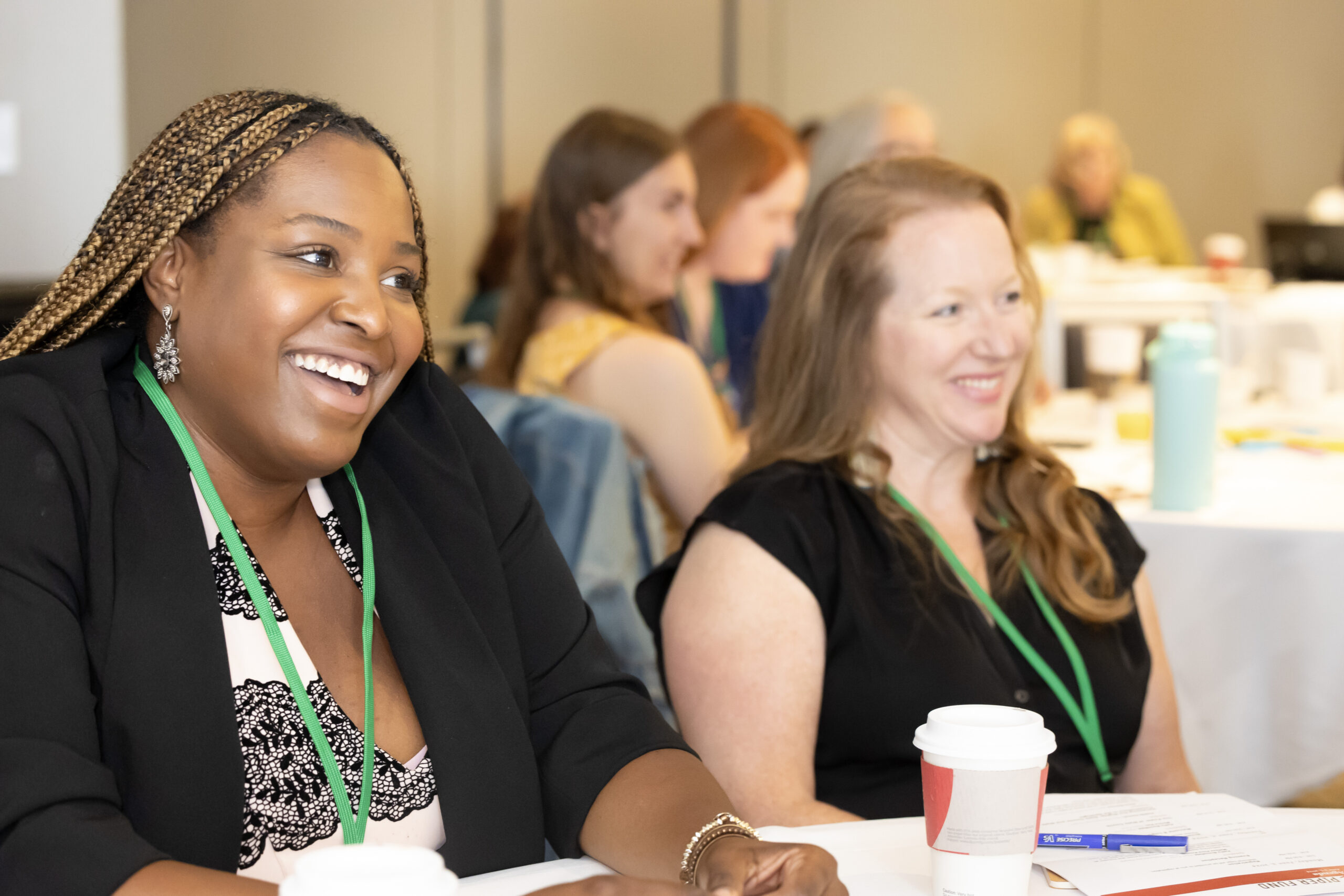 That involvement must counter a right-wing agenda committed to, among other things, Federalist Society judge selection, Christian nationalism, voter suppression, defunding public schools, anti-immigration laws, abortion rights reversals, and homo- and transphobic policies. It is generally funded with so-called “dark money.”
That involvement must counter a right-wing agenda committed to, among other things, Federalist Society judge selection, Christian nationalism, voter suppression, defunding public schools, anti-immigration laws, abortion rights reversals, and homo- and transphobic policies. It is generally funded with so-called “dark money.”
Alex Aronson of Court Accountability outlined that agenda, which is designed, he said, to “break the levers of democratic pushback” and engineer “the consolidation of minoritarian power,” essentially capturing and entrenching the judiciary with right-wing partisan allies. Their playbook is the 920-page document called Project 2025.
Dimitry Kochenov of the Central European University brought a global context to the conversation, describing attacks on progressive judges and the rule of law in countries like Hungary and Poland as warning models for the United States. European authoritarian leaders “don’t want democracy to function,” he said.
Those bleak presentations forced the conveners to get down to the nitty-gritty of the gathering: How to effectively combat this reactionary effort to control state courts and, in related actions, how to hinder extremists’ intent on weakening the courts’ authority.
To organize and deliver public support for a just court system, the group heard from various experts that humanizing the issues – and being clear about what is at stake in people’s everyday lives — is critical to persuasion in face-to-face and other messaging channels.
Doing so could make an otherwise intimidating, complex, and insulated branch of government understandable to ordinary people.
There are many ways to deliver a compelling message. While common themes about state courts and justice may exist, different issues, tones, and approaches are likely to convince different kinds of people in Philadelphia versus Iowa or Alabama versus Alaska.
For some organizations and audiences, street theater and shocking silliness might work to garner media attention. A presentation from the Center for Artistic Activism emphasized such tactics.
For others, as in Iowa, the messaging from Justice Not Politics is contoured for its constituents’ Midwestern sensibilities. That means, said the grassroots organization’s communications leader Steve Miller, “consistent and regular communications. We focus on the court system and nurture supporters when there’s not a crisis,” he said. “But we’re always poised for action.”
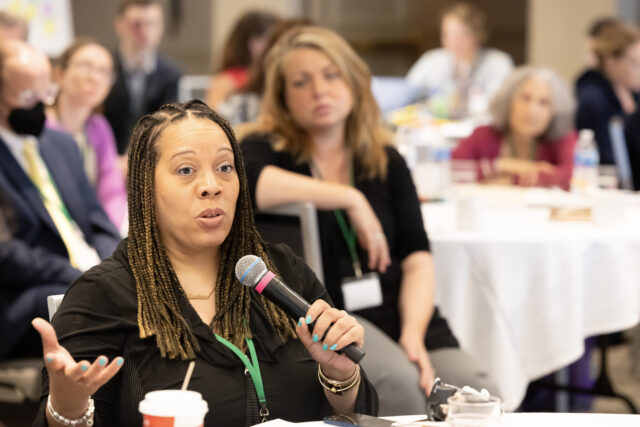 In other locations, messaging must be issue-oriented and culturally focused.
In other locations, messaging must be issue-oriented and culturally focused.
“You have to integrate the courts into all of people’s issues,” said Kadida Kenner of The New Pennsylvania Project.
“When we’re talking about the judiciary in places like Mississippi, Georgia, and Louisiana, it is a race-based system,” said Jones of 1Hood Media. “Moving away from that, because we’re trying to talk about ‘the legitimacy of the courts’ hurts our organizing. You have to fight your funders, and you have to fight national organizations that fly into the state and tell you what to say with your messaging.”
One of those out-of-state consultants, Goodwin Simon Strategic Research’s Naser Javaid, agreed with Jones about keeping messages specific to an audience and not generic. Previously, Goodwin Simon Strategic Research developed a messaging roadmap for the Piper Fund. At the convening, Javaid and his colleague, Yule Kim, offered recent videos of focus groups from a handful of states. From those interviews, Goodwin Simon is learning what messages might resonate right now across the nation.
They offered preliminary findings to help groups form tailored messages. Among them:
An entertaining but pointed punctuation mark closed the convening. It was a YouTube video shot in a park at a concert. It showed a young man dancing alone wildly. But soon, one, two, three, then tens of jubilant dancers joined to create a conglomeration of joy.
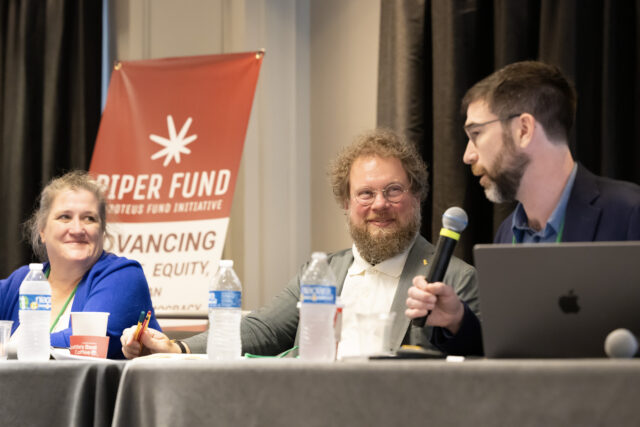
Dancing, yes. But it stood for more. It stood as an ode to dynamic leadership and, just as importantly, to the power of committed followers.
“Eventually,” said Bonnifield, “each of you is that one dancer.”
That was the closing message of the Judicial Integrity 2024 Convening: as lonely as it might be, activists must take the lead in seeking justice in our state courts and preserving our fragile democracy. Followers will rise to join the dance.
Jay Weiner, a longtime Twin Cities journalist, speechwriter, and editor, authored this piece. Photos were taken by Anna Min.
Visual notetaker Katherine Torrini helped to capture the rich sharing and learning that occurred at the convening.
